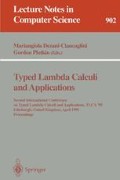Abstract
The terms of the simply-typed λ-calculus can be used to express the higher-order abstract syntax of objects such as logical formulas, proofs, and programs. Support for the manipulation of such objects is provided in several programming languages (e.g. λProlog, Elf). Such languages also provide embedded implication, a tool which is widely used for expressing hypothetical judgments in natural deduction. In this paper, we show how a restricted form of second-order syntax and embedded implication can be used together with induction in the Coq Proof Development system. We specify typing rules and evaluation for a simple functional language containing only function abstraction and application, and we fully formalize a proof of type soundness in the system. One difficulty we encountered is that expressing the higher-order syntax of an object-language as an inductive type in Coq generates a class of terms that contains more than just those that directly represent objects in the language. We overcome this difficulty by defining a predicate in Coq that holds only for those terms that correspond to programs. We use this predicate to express and prove the adequacy for our syntax.
Preview
Unable to display preview. Download preview PDF.
References
A. Asperti and G. Longo. Categories, Types, and Structures. MIT Press, Foundations of Computing Series, London, England, 1991.
A. Avron, F. Honsell, I. A. Mason, and R. Pollack. Using typed lambda calculus to implement formal systems on a machine. Journal of Automated Reasoning, 9(3):309–354, Dec. 1992.
J. Despeyroux and A. Hirschowitz. Higher-order syntax and induction in coq. In Proceedings of the fifth Int. Conf. on Logic Programming and Automated Reasoning (LPAR 94), Kiev, Ukraine, July 16–21, 1994, 1994. Also available as an INRIA Research Report RR-2292, Inria-Sophia-Antipolis, France, June 1994.
G. Dowek, A. Felty, H. Herbelin, G. Huet, C. Murthy, C. Parent, C. Paulin-Mohring, and B. Werner. The coq proof assistant user's guide. Technical Report 154, INRIA, 1993.
A. Felty. A logic programming approach to implementing higher-order term rewriting. In L.-H. Eriksson, L. Hallnäs, and P. Schroeder-Heister, editors, Proceedings of the January 1991 Workshop on Extensions to Logic Programming, pages 135–161. Springer-Verlag LNCS, 1992.
A. Felty. Implementing tactics and tacticals in a higher-order logic programming language. Journal of Automated Reasoning, 11(1):43–81, Aug. 1993.
J. Hannan. Investigating a Proof-Theoretic Meta-Language for Functional Programs. PhD thesis, University of Pennsylvania, Technical Report MS-CIS-91-09, Jan. 1991.
J. Hannan and D. Miller. From operational semantics to abstract machines. Mathematical Structures in Computer Science, 2:415–459, 1992.
J. Hannan and F. Pfenning. Compiler verification in LF. In Seventh Annual Symposium on Logic in Computer Science, pages 407–418, 1992.
R. Harper, F. Honsell, and G. Plotkin. A framework for denning logics. Journal of the ACM, 40(1):143–184, Jan. 1993.
S. Michaylov and F. Pfenning. Natural semantics and some of its meta-theory in elf. In L.-H. Eriksson, L. Hallnäs, and P. Schroeder-Heister, editors, Proceedings of the January 1991 Workshop on Extensions to Logic Programming, pages 299–344. Springer-Verlag LNCS, 1992.
D. Miller. Unification of simply typed lambda-terms as logic programming. In Eighth International Logic Programming Conference. MIT Press, 1991.
C. Paulin-Mohring. Inductive definitions in the system Coq; rules and properties. In M. Bezem and J. F. Groote, editors, Proceedings of the International Conference on Typed Lambda Calculi and Applications, volume 664, pages 328–345. Springer Verlag Lecture Notes in Computer Science, 1993.
F. Pfenning and E. Rohwedder. Implementing the meta-theory of deductive systems. In Eleventh International Conference on Automated Deduction, pages 537–551. Springer-Verlag LNCS, 1992.
Author information
Authors and Affiliations
Editor information
Rights and permissions
Copyright information
© 1995 Springer-Verlag Berlin Heidelberg
About this paper
Cite this paper
Despeyroux, J., Felty, A., Hirschowitz, A. (1995). Higher-order abstract syntax in Coq. In: Dezani-Ciancaglini, M., Plotkin, G. (eds) Typed Lambda Calculi and Applications. TLCA 1995. Lecture Notes in Computer Science, vol 902. Springer, Berlin, Heidelberg. https://doi.org/10.1007/BFb0014049
Download citation
DOI: https://doi.org/10.1007/BFb0014049
Published:
Publisher Name: Springer, Berlin, Heidelberg
Print ISBN: 978-3-540-59048-4
Online ISBN: 978-3-540-49178-1
eBook Packages: Springer Book Archive

